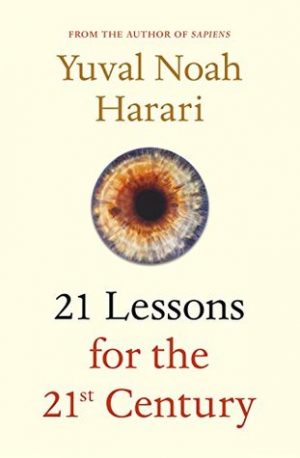Fans of Homo Sapiens and Homo Deus will no doubt run to buy the latest instalment: 21 Lessons for the 21st Century by Yuval Harari. Whereas Homo Sapiens dealt with the past and Homo Deus with the future, his last book – you guessed it – is about now. Harari has an enviable ability to present complex ideas, however depressing, with clarity and humour. I don’t necessarily buy into all of his theories and sometimes I wish he’d gone into more depth. The book suffers from being a collection of essays written for various publications rather than a coherently planned book. (Do I smell a faint whiff of publishers’ opportunism?) But the fact that he engages millions of people around the world in thinking about ‘big issues’ is a redeeming factor for me. Read it as an accessible catalyst for your own thoughts.
Ours are not cheerful times. Terrorism, climate change, mass migration, cyber threats, Trump, Brexit – there’s no shortage of topics for Harari to tackle and for us to worry about. And Harari doesn’t necessarily provide solutions, but he has plenty of theories as to why things are as they are. An illuminating example for me was his theory behind Brexit and Trump.
In the twentieth century, the masses revolted against exploitation, and sought to translate their vital role in the economy into political power. Now the masses fear irrelevance, and they are frantic to use their remaining political power before it’s too late. Brexit and Trump might thus demonstrate and opposite trajectory to that of traditional socialist revolutions.
Harari has a rather gloomy view of the future of technology. We should view, he argues, the marriage of infotech and biotech as the real threat to democracy. The election interference we’ve seen lately is just the tip of the iceberg. Artificial intelligence will change our labour markets for ever, with robots replacing humans thereby creating a large obsolete class of people. The gap between the very rich owners of data and technology and the very poor unemployed ever widening. Harari visits the intriguing idea of a ‘robot’ tax to fund a Universal Basic Income, basically a salary for the obsolete.
Harari has an interesting theory of expansionary warfare and how in the modern context, few countries are willing to go down that route. Putin’s annexation of Crimea was only possible, argues Harari, as a large part of its population are of Russian origin. He moves on to education, the role of religion, fake news, to mention but a few.
I judge Harari’s book as a reader not an historian or a philosopher, and the immediate attraction with this book is the accessible, at times funny, writing. Some would argue it’s too much so but there’s a reason Harari has succeeded, where many academics have failed, in reaching millions.
There are plenty of interesting perspectives and thought-provoking ideas here. Odd then that Harari decides to end on the topic of meditation. I can absolutely see how it can help him and others in finding equilibrium in their everyday lives and give people a breathing space in our over-stimulated world, but it just seems out of place next to problems like populism and climate change. As a stand-alone article, it probably worked well. As the final chapter in this kind of book, it just seems weird.
And this brings me to the central problem with 21 Lessons for the 21st Century: it’s a collection of essays put together as a book. I can’t help but feeling that Harari and his publishers have been seduced by the prospect of selling a few million more books. Next time, Yuval, please take the time to go slower, deeper and with a plan, and I will buy it for sure.
21 Lessons for the 21st Century by Yuval Harari is published by Jonathan Cape, 318 pages.





